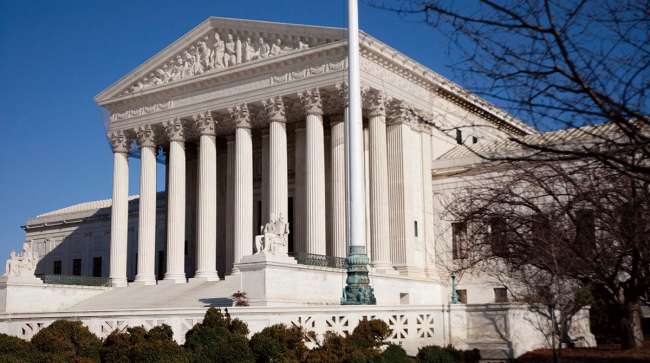Senior Reporter
Supreme Court Declines to Hear California AB 5 Contractor Law Appeal

[Stay on top of transportation news: Get TTNews in your inbox.]
The U.S. Supreme Court announced on June 30 it has declined to hear an appeal of a California state law aimed at reclassifying owner-operators as motor carrier employees.
In an order list, the high court without comment denied a petition for review by the California Trucking Association of California’s AB 5 law that CTA has said includes a legal test, known as the three-pronged “ABC test,” that will all but ensure that independent owner-operators will be reclassified as carrier employees.
The denial leaves in place the 9th U.S. Circuit Court of Appeals decision that federal law does not pre-empt application of AB 5 law to owner-operators. Eventually, the case will have to go back to the district court to consider CTA’s “commerce clause” claim.
ABC Test
The three-pronged ABC test dictates that a worker is considered an independent contractor to whom a wage order does not apply only if the hiring agency establishes:
►A: That the worker is free from the control and direction of the hirer in connection with the performance of work, both under the contract for the performance of such work and in fact.
►B: That the worker performs work that is outside the usual course of the hiring entity’s business.
►C: That the worker is customarily engaged in an independently established trade, occupation or business of the same nature as the work performed for the hiring entity.
The court of appeals held that CTA was unlikely to succeed on the Federal Aviation Administration Authorization Act’s pre-emption issue. After reviewing relevant precedent, the appeals court explained that “a generally applicable state law is not ‘related to a price, route, or service of any motor carrier’ for purposes of the FAAAA unless the state law ‘binds the carrier to a particular price, route or service’ or otherwise freezes them into place or determines them to a significant degree.”
CTA reacted strongly.
“Gasoline has been poured on the fire that is our ongoing supply chain crisis,” the association said in a release. “In addition to the direct impact on California’s 70,000 owner-operators who have seven days to cease long-standing independent businesses, the impact of taking tens of thousands of truck drivers off the road will have devastating repercussions on an already fragile supply chain, increasing costs and worsening runaway inflation.
“We are disappointed the Court does not recognize the irrevocable damage eliminating independent truckers will have on interstate commerce and communities across the state. The Legislature and (Gov. Gavin) Newsom Administration must immediately take action to avoid worsening the supply chain crisis and inflation.”
The high court’s decision quickly lifts a federal district court’s injunction that has stood for roughly two years, making compliance with AB 5 a reality for trucking companies in California, said a June 30 statement by the Indianapolis-based trucking law firm of Scopelitis, Garvin, Light, Hanson & Feary. “Motor carriers should immediately evaluate their California operations to determine what steps, if any, should be taken to respond to the changed backdrop for trucking,” the firm said.
Another trucking attorney, Rob Moseley with Moseley Marcinak Law Group LLP of Greenville, S.C., said, “I don’t think we’ve heard the last of this because there are constitutional issues with the enforcement of this.”
However, Moseley said he believes the AB 5 law will be enforceable after an injunction is lifted in the federal district court “in short order.”
He’s convinced the AB 5 law could impact truckers not domiciled but doing business in California.
“California has a way of governing things outside its borders,” Moseley said. “There will be an attempt, I suspect, to enforce the law with independent contractors who aren’t based in California, but pass through California.”
The Supreme Court’s decision comes roughly a month after the U.S. solicitor general recommended that the high court decline to hear the appeal of the case. In a brief, the solicitor general said the 9th Circuit’s ruling “correctly determined” that CTA was unlikely to succeed on its claim that the FAAAA pre-empts applying the ABC test as codified under California law to owner-operators, and the court’s decision does not conflict with any decision of this court.”
However, CTA countered in its reply that the AB 5 law “would cause motor carriers and owner-operators to bear the substantial, if not insurmountable, costs and burdens associated with shifting to an employer/employee business model.”
Want more news? Listen to today's daily briefing above or go here for more info
CTA added, “The government’s brief calls to mind the question famously posed by Chico Marx: ‘Who you gonna believe, me or your own eyes?’ ”
CTA added, “In fact, AB 5 law was designed to, and surely will, upend the operation of the trucking industry.” CTA has noted that “amicus curiae briefs supporting the appeal have been filed with the courts by users of trucking services with no ax to grind in the litigation; these groups’ only goal is obtaining affordable and efficient shipping, and believe that AB 5 will have ‘profoundly destructive effects.’ ”
In a statement, California Attorney General Rob Bonta's office said, “We’re pleased with the court’s decision to reject this challenge to AB 5's application to the motor carrier industry. At the California Department of Justice, we’ll continue to do our part to defend laws that are designed to protect workers and ensure fair labor and business practices.”
Todd Spencer, president of the Owner-Operator Independent Drivers Association, said after the June 30 decision, "With AB 5 now set to go into effect, thousands of owner-operators driving in California face an uncertain future. California has provided no guidance to owner-operators about how they can work as independent contractors under this new scheme, and truckers will be at the mercy of the courts to interpret how the law will be applied.
"For truckers that have invested their blood, sweat and treasure to create their own businesses, it is dismaying that lawmakers and the courts are forging ahead with this radical policy that dismisses a beneficial business model that has been in place for decades.
"At the same time, we know this will not be last word on the legality of AB 5 and expect to participate in future challenges to the law."




